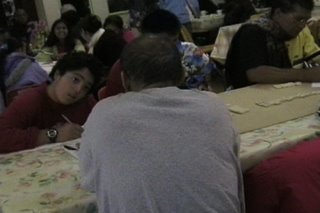
My 7th grade students recently completed Juniors to Seniors, a service/learning project with senior citizens at the Prospect Hill Senior Center in Park Slope, Brooklyn. Prospect Hill provides activities and services for the elderly, including group trips, health services, and Meals on Wheels. Students visited Prospect Hill several times to meet and interview matched seniors to learn about their beliefs and experiences. Following our visits, the students drafted narrative profiles for publication.
Service/learning is an alternative method of education that integrates (old-school) classroom learning and (new-jack) community service. First, teachers and students identify a real community need. Second, we identify supportive community resources and establish a strong partnership with a neighborhood agency. Third, our partnership develops clear objectives, including specific curriculum and program expectations.
Service/learning can be challenging for teachers to integrate into classroom instruction. For example, your school may have a strict, standardized curriculum, and there may be tremendous pressure to lead classrooms through scripted lessons. So, why is service/learning important?
- First, effective service/learning projects help students to learn and retain core academic content. Research demonstrates that creative or experiential education increases student achievement. We may only learn 10% of what we hear; however, we retain up to 80% of what we experience and 90% of what we teach.
- Second, service/learning promotes positive youth development. For example, research explains that participating students demonstrate increased agency, awareness, esteem, and resilience. Participating students are more likely to believe they are able to effect positive change than students who do not participate in service learning programs.
- Third, service/learning is an important tool for classroom and community development. Successful projects promotes student cooperation, partnership, and teamwork. Service/learning also fosters renewable connections between students, communities, and schools. Select research explains that service/learning actively engages students in democracy: students with experience in service/learning are more like to volunteer and to vote.
- Fourth, service/learning can help new teachers to plan teaching and learning over time. Professor Erick Gordon at Teachers College, Columbia University explains that early in his career he invented new tricks to engage students each day. "Lessons worked," he says. "But it was exhausting." Over time, Erick learned that integrated lessons help to streamline planning, manage classroom behavior, and encourage sustained cooperative learning.
Service/learning is an effective and meaningful way to advance student learning: in the classroom and in the community. Juniors to Seniors specifically helped students develop inquiry and narrative writing. Most significantly, the project also helped changed their attitudes about the elderly. "Before I went to the senior center," one student writes, "I wasn’t too happy about the trip because I didn’t think the seniors would like me. But after going to the center, I realized that seniors aren’t what younger people think they are." Another student explains, “My impression of seniors changed. I thought they would be mean, grumpy, and smelly. But, it turns out they are really nice. The visits were fun and I really did enjoy them.”


No comments:
Post a Comment